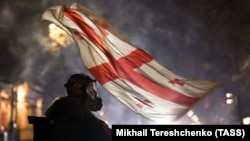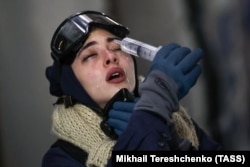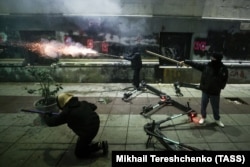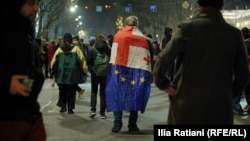Georgian photographers who have covered months of protests in their capital, Tbilisi, say they are "deeply disturbed" at the awarding of a World Press Photo prize to a photographer working with the Russian state news agency TASS.
Russian photojournalist Mikhail Tereshchenko captured protests that broke out in central Tbilisi in late 2024 after Georgia unexpectedly suspended talks on EU accession. His series of images capturing the fiery nighttime protests was named a winner in the European stories category of the 2024 World Press Photo awards.
In an open letter posted to social media on March 30, Georgian photojournalists protested that TASS, a Kremlin-funded news outlet, represents precisely the political forces many Georgian protesters took to the streets to oppose.
"Awarding a photographer aligned with the Kremlin's narrative for covering anti-Russian demonstrations is not only deeply contradictory but also a direct insult to those risking their lives to oppose Russian interference in Georgia's sovereignty and future," the photographers said.
The World Press Photo (WPP) Foundation has responded to complaints over the prize by pointing out the photos were presented to their jury anonymously and therefore judged on visual and journalistic merit alone.
"We do not exclude photographers from any country," the WPP statement read.
"While recognizing the realities of state propaganda, we believe even photographers working in places with little press freedom can create meaningful work. We also believe in supporting photojournalists and documentary photographers living and working in places with limited press freedoms. This is a challenge in too many countries, including Russia."
Tereshchenko has previously worked alongside the Russian military covering the invasion of Ukraine. In a recent interview he referred to the Russian capture of Mariupol as a "liberation."
The WPP has distanced itself from the Russian photojournalist's wording. "We are not responsible for statements by winning photographers, or how their work is used by news agencies," the statement read.
The WPP says it is standing by the award until a review of how the prize was chosen is completed.
The Tbilisi photographs are not the only controversy generated by this year's awards. Ukrainian photographers have protested the pairing of two images from opposing sides of the Russian invasion of Ukraine. One shows a gravely wounded Russian fighter, another a displaced Ukrainian child.
"This is the worst example of a false moral equivalence between an aggressor and one who defends against aggression. The Ukrainian child had no choice -- her country was unjustly attacked," Heorhiy Tykhiy, spokesman for Ukraine's Foreign Ministry, posted on X in response to the linked images.
The WPP described the two photos as "a powerful pairing" that creates a "more nuanced view of a conflict with far-reaching global ramifications."










